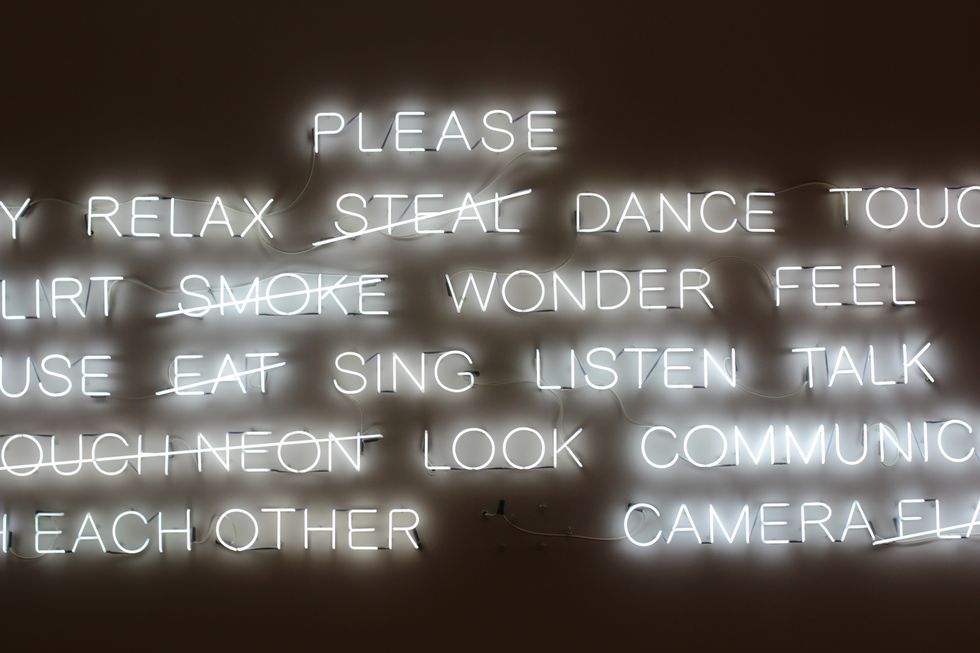After writing fiction and non-fiction for nearly ten years now, I like to think of myself as a master procrastinator, but sometimes I do legitimately suffer from a "block" in my creativity. Whenever I've tried to write anything at all, my fingers seize and I wonder: Why am I doing this? What happens when I run out of ideas? Am I saying anything worth the effort of writing it, or are other people reading it? Haven't other people said it better than me? Can I even write well? Why can't I come up with any decent ideas?
For myself, I don't know the answers to any of these questions, but here are a few tips for when you reach the point that such questions keep you from writing.
1. Go outside
Don't chain yourself to your keyboard and force yourself to make words, because that probably won't work.
I will be the first to admit that I do not like to go outside. Particularly in the sweltering summer months in Arizona, I hate leaving my cold dark room for anything, especially for anything unnecessary. Even still, I have to make sure that I go places for fun, like to the movies, or shopping, or to a new restaurant. I enjoy being in my own headspace, but it's also important to get out of it and to be stimulated by the world around me.
2. Take a break or waste some time

3. Get a different perspective
Whether that means going on a trip or switching writing spots (I personally alternate between my bed, several cafes, and the library), sometimes "getting a different perspective" may mean getting into a different atmosphere, or it may mean visiting a different city. Do what is within your means, but sometimes a change of scenery can work wonders for creativity.
4. Read. A lot.
Reading seems to naturally teach us how to write better. When you've run out of words, immerse yourself in a well-told story, or several. Consider reading something just for entertainment. It can take a lot of reading to produce something substantial, especially if you're working on a longer project like a novel.
5. Keep a writing journal
One way to hone your craft is to take notes. Consider reading about the writing processes of other writers and summarizing what you learned. Write journal entries in which you try to be as honest as possible about your progress, your thoughts, and what you want out of writing. I carry a journal around with me wherever I go to take notes in or to jot down story ideas. Sometimes I write bad poetry in them.
6. Write something for yourself
Sometimes, writers get so focused on producing work for readers that they lose track of why they actually write, and this is simply because they enjoy it. Whether it's a poem, a short story, or a personal essay, try writing something because you want to. It doesn't have to be shown to anyone; it just has to be fun to write.
7. Channel your creative energy into something else
I find sometimes that drawing helps me to take a break from writing while still getting my creative energy out. To me, creative activities like drawing and practicing an instrument provide more tangible and satisfying results than writing usually does.
8. Permit yourself to write badly
The worst stage of writing is when every. Word. Is. Pain.
Sometimes even when you feel inspired to write, it somehow turns out terribly. Essentially, any creative endeavor churns out mostly garbage. This is what editing and re-writing are for. It's easier to simply acknowledge this and let yourself write badly if you must. Writing something is better than writing nothing.
9. Clean something
Whether it's the dishes or your room or yourself, try cleaning something. When your mind is idle and you're doing something physical and immediately rewarding, it leaves room for your mind to wander and get some inspiration.
Some of my most inspired moments and fiction pieces have come while doing the dishes or while in the shower. It also helps some people to feel productive when their workspace and selves are clean and orderly. A well-kept house, office, and self can make all the difference if motivation is the issue.
10. Get involved in a community
I can never pass the yearly NaNoWriMo (National Novel Writing Month) challenge in November without going to write-ins and meeting other writers. When I'm in a productive community of like-minded people, I am surrounded by those who are going through the same writing-related struggles, by those who understand and by those who can give me good advice. Consider joining or finding such a community in your city or university or by attending a creative writing class, because it makes a huge difference.
11. Always be writing
Even on the days you don't feel that you have anything decent to say, write about your day and about your general thoughts. Set a manageable goal of 300-500 words per day, minimum. As long as you write anything, you're practicing, and that's still worth something.
12. Write about writer's block
Either write about your block or about the concept in general. I'm writing about that very subject right now, and it is helping me to get over my own blocks. Try thinking of what inspires you and what conditions created your best work. If you're held back by fear, confront it by being honest with yourself. Give yourself advice, follow it, and then come back to write again.
And consider this: It's only a block if you give it the power to be one.
Because even when you feel drained, you're still a writer at heart, still feeling that need to make something out of words that
In pursuing writing, it's important to remember to step back from it, breathe, socialize, and generally take care of yourself. If you need it, maybe get away from social media a while to get away from the idea of being a "writer" and actually practice being one. That's probably the only cure to the fabled "block".














 women in street dancing
Photo by
women in street dancing
Photo by  man and woman standing in front of louver door
Photo by
man and woman standing in front of louver door
Photo by  man in black t-shirt holding coca cola bottle
Photo by
man in black t-shirt holding coca cola bottle
Photo by  red and white coca cola signage
Photo by
red and white coca cola signage
Photo by  man holding luggage photo
Photo by
man holding luggage photo
Photo by  topless boy in blue denim jeans riding red bicycle during daytime
Photo by
topless boy in blue denim jeans riding red bicycle during daytime
Photo by  trust spelled with wooden letter blocks on a table
Photo by
trust spelled with wooden letter blocks on a table
Photo by  Everyone is Welcome signage
Photo by
Everyone is Welcome signage
Photo by  man with cap and background with red and pink wall l
Photo by
man with cap and background with red and pink wall l
Photo by  difficult roads lead to beautiful destinations desk decor
Photo by
difficult roads lead to beautiful destinations desk decor
Photo by  photography of woman pointing her finger near an man
Photo by
photography of woman pointing her finger near an man
Photo by  closeup photography of woman smiling
Photo by
closeup photography of woman smiling
Photo by  a man doing a trick on a skateboard
Photo by
a man doing a trick on a skateboard
Photo by  two men
two men  running man on bridge
Photo by
running man on bridge
Photo by  orange white and black bag
Photo by
orange white and black bag
Photo by  girl sitting on gray rocks
Photo by
girl sitting on gray rocks
Photo by  assorted-color painted wall with painting materials
Photo by
assorted-color painted wall with painting materials
Photo by  three women sitting on brown wooden bench
Photo by
three women sitting on brown wooden bench
Photo by 
 Photo by
Photo by  Photo by
Photo by  Photo by
Photo by  Photo by
Photo by 


 people sitting on chair in front of computer
people sitting on chair in front of computer



 all stars lol GIF by Lifetime
all stars lol GIF by Lifetime two women talking while looking at laptop computerPhoto by
two women talking while looking at laptop computerPhoto by  shallow focus photography of two boys doing wacky facesPhoto by
shallow focus photography of two boys doing wacky facesPhoto by  happy birthday balloons with happy birthday textPhoto by
happy birthday balloons with happy birthday textPhoto by  itty-bitty living space." | The Genie shows Aladdin how… | Flickr
itty-bitty living space." | The Genie shows Aladdin how… | Flickr shallow focus photography of dog and catPhoto by
shallow focus photography of dog and catPhoto by  yellow Volkswagen van on roadPhoto by
yellow Volkswagen van on roadPhoto by  orange i have a crush on you neon light signagePhoto by
orange i have a crush on you neon light signagePhoto by  5 Tattoos Artist That Will Make You Want A Tattoo
5 Tattoos Artist That Will Make You Want A Tattoo woman biting pencil while sitting on chair in front of computer during daytimePhoto by
woman biting pencil while sitting on chair in front of computer during daytimePhoto by  a scrabbled wooden block spelling the word prizePhoto by
a scrabbled wooden block spelling the word prizePhoto by 
 StableDiffusion
StableDiffusion
 StableDiffusion
StableDiffusion
 StableDiffusion
StableDiffusion









